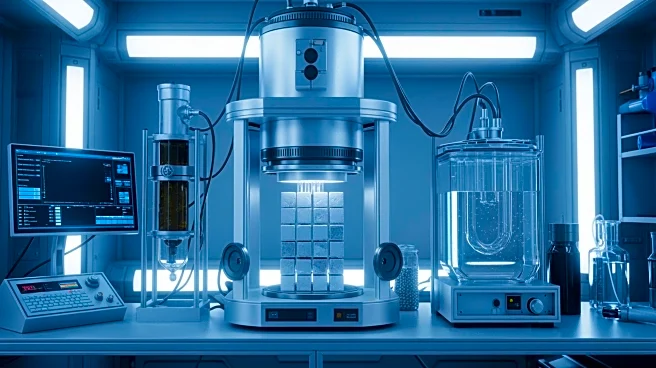What's Happening?
The European Space Agency (ESA) is set to test a new type of space food aboard the International Space Station (ISS) that is made from urine and air. Developed by Finnish startup Solar Foods, the product named Solein is a protein powder created through
a gas fermentation process using microbes, air, and electricity. The key ingredient, urea, found in urine, provides the nitrogen source necessary for protein synthesis in space. The project aims to develop sustainable food solutions for long-duration space missions, such as those to the Moon and Mars, where traditional food supply methods are impractical. The ESA plans to test the manufacturing process in microgravity aboard the ISS to ensure the organism grows as it does on Earth.
Why It's Important?
This development is crucial for the future of space exploration, as it addresses the challenge of sustaining astronauts on long-duration missions with limited supplies. By creating food from readily available resources like urine, the ESA aims to improve the autonomy and resilience of human spaceflight. The success of this project could lead to significant advancements in space travel, reducing the dependency on Earth-based food supplies and potentially lowering costs. It also highlights the innovative use of fermentation technology in extreme environments, which could have broader applications in sustainable food production on Earth.
What's Next?
The ESA will initially focus on developing the technology on Earth over the next eight months. If successful, the manufacturing process will be trialed in a microgravity environment aboard the ISS. The ultimate goal is for Solein to become a staple food for astronauts, supporting missions to Mars and beyond. The project is part of a broader effort to develop key capabilities for future space exploration, with potential collaborations with other space agencies and private companies like SpaceX.
Beyond the Headlines
The use of urine as a resource for food production raises ethical and cultural questions about sustainability and resource utilization in space. It challenges traditional notions of food and waste management, potentially leading to new paradigms in both space and terrestrial environments. The project also underscores the importance of interdisciplinary collaboration in solving complex problems, combining expertise in microbiology, engineering, and space science.


















